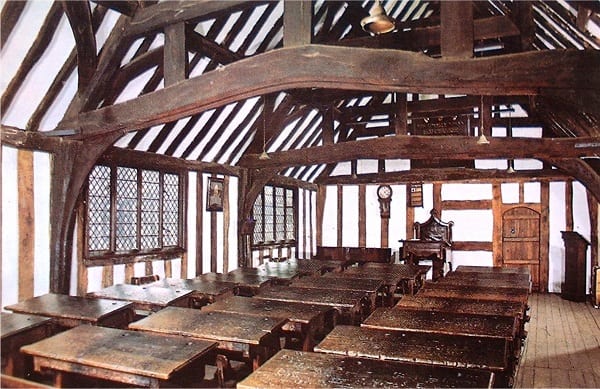Shakespeare’s school years are not well documented, but there is plenty of information about school-life during Shakespeare’s time.
William started at the King Edward VI Grammar School (called The King’s New School) when he was seven. The grammar schools covered the country and most boys with the same background as William attended them. Girls didn’t go to school, although there were some radical people who employed tutors for their daughters, but that was rare among the ordinary people. There was a national curriculum for the grammar schools, set by the monarch.
Schoolboys had a long, hard, unvaried day, from Monday to Saturday. They started at 6 or seven in the morning and finished at 5 or 6 in the evening with a two-hour break for dinner. There was no physical education or sport and no vacations apart from the odd religious holiday, which was never more than one day in length. Church on Sunday was compulsory and the service went on for hours. Much later, Shakespeare recalled the feeling in As You Like It with one of his perfect encapsulations:
…the whining schoolboy, with his satchel
And shining morning face, creeping like snail
Unwillingly to school. ( Act 2, Scene 7)
Latin was at the heart of the curriculum and the method of learning was to memorise long passages of Latin prose and poetry. Latin was the international language of Europe and it was used in the law, the medical profession and the Church. If you wanted to enter any of the professions you had to be a fluent Latin speaker. William would also have been drilled in grammar, logic, rhetoric, arithmetic and astronomy. Music was also on the curriculum. There were rigorous tests every week and if you didn’t pass you were cruelly sanctioned with physical punishment.
Ben Jonson, wasn’t impressed with the education his best friend had acquired at school because he said of Shakespeare that he had ‘small Latin and less Greek.’
When he was fourteen Shakespeare’s father somehow fell from favour and his sons had to leave school. We lose track of William at this point and don’t see him again until his wedding day. We can be sure that he didn’t just sit around doing nothing, though: he would have had to work, particularly as his father was having difficulty in supporting the family. We don’t know what he did, although his plays show a great deal of knowledge about Elizabethan common occupations such as cobbling, baking, farming and so on. It could have been any of those that he worked at. Perhaps he worked on the farm of Anne Hathaway‘s brother. That would explain a lot!
At some point, though, the teenage Will would have been dreaming about a career in acting. One of the school’s customs may have been the most important influence on the boy who was to become the greatest man of the theatre in history. At the end of term, the school put on classical plays. How tempting it is to think that young Will caught the acting bug in school plays
As for the inner life of this teenager, we can only speculate. He may have written poems that we know nothing about; he may have made up stories, and even written them down. If he did, they are lost to us, but it would be absurd to think that anyone could suddenly write something like the Henry VI plays in his early twenties, followed by increasingly wonderful plays and poems, without having had a mental and emotional preparation for it that went back to his adolescent years. And certainly, he later captured the intensity of adolescence, going deep into the emotions of those two most famous teenagers in love, Romeo and Juliet, in a depiction of it that is definitive and identified with by every modern teenager who encounters the play.

Shakespeare’s likely classroom at Kings New School




very useful thank you
i am doing a power point
This web page help me a lot in the movie that I’m making for history class and can’t wait to go deeper into Shakespeare
THANKS A LOT TO YOUR WEBSITE
Great to hear – best of luck with your movie project!